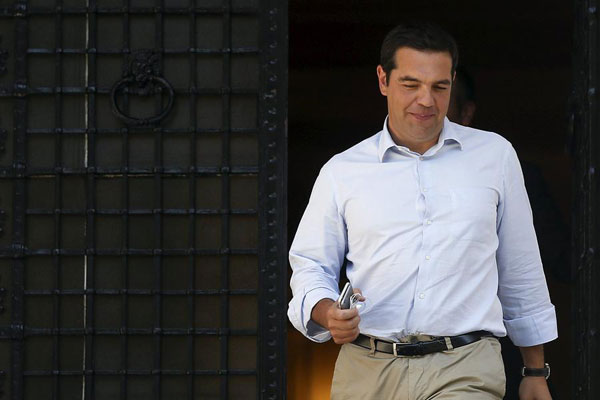Greek PM to resign, seek snap election in September
(Agencies) Updated: 2015-08-20 22:27
 |
|
Greek Prime Minister Alexis Tsipras leaves his office in Athens, Greece, August 20, 2015.[Photo/Agencies] |
ATHENS - Greek Prime Minister Alexis Tsipras will resign on Thursday to pave the way for early elections on Sept. 20, government officials said, hoping to quell a rebellion in his leftist Syriza party and seal support for a bailout programme.
Tsipras's decision to return to the ballot box after seven bruising months in power deepens political uncertainty on the very day Greece began receiving funds under its third bailout programme with foreign creditors.
But a snap election should allow Tsipras to capitalise on his popularity with Greek voters before the toughest parts of the programme begin to bite, and may allow him to return to power in a stronger position without anti-bailout rebels in his radical left Syriza party to slow him down.
Greek two-year bond yields jumped 78 basis points to 12.15 percent, while Greek stocks closed down 3.5 percent.
"The aim is to hold elections on Sept. 20," a government source said after Tsipras held talks with his advisers. The leftist leader is expected to make a televised address at 8 p.m. local (1700 GMT).
Tsipras had long been expected to seek early elections in the autumn to consolidate his position after caving into the creditors' demands for more austerity and economic reform in return for 86 billion euros ($96 billion)in bailout loans.
But he was forced to move quickly after nearly a third of Syriza lawmakers refused to back the programme in parliament last week, robbing him of a guaranteed political majority.
Greece's complex constitution has special stipulations for holding elections less than 12 months after the previous vote, meaning the president must first consult other major parties to see if they can form a government - a highly unlikely option.
Hugely popular among his supporters for trying to stand up to euro zone and IMF creditors and with the opposition in disarray, Tsipras is widely expected to return to power.
A Metron Analysis poll on July 24 put support for Syriza at 33.6 percent, making it by far the most popular party, but not enough to govern without a coalition partner. No polls have been published since then due to the holiday season.
Since being elected in January as the head of the first radical leftist government in modern Greek history, Tsipras fought a bitter battle with the creditors who have ploughed aid into Greece on condition of budget cuts and tax increases.
The prolonged standoff forced Athens to shut its banks for three weeks and impose capital controls before Tsipras accepted the bailout under threat of a financial collapse and Greek exit from the euro currency.
With the bailout finally approved in parliament and the first installment of aid disbursed - allowing Greece to repay a debt to the European Central Bank that fell due on Thursday - Tsipras is turning his focus to internal politics.






